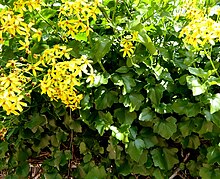| Senecio angulatus | |
|---|---|

| |
| Scientific classification | |
| Kingdom: | Plantae |
| Clade: | Tracheophytes |
| Clade: | Angiosperms |
| Clade: | Eudicots |
| Clade: | Asterids |
| Order: | Asterales |
| Family: | Asteraceae |
| Genus: | Senecio |
| Species: | S. angulatus
|
| Binomial name | |
| Senecio angulatus L.f. (1781)
| |

| |
| Native range of S. angulatus | |
| Synonyms | |
| |
Senecio angulatus, also known as creeping groundsel[5] and Cape ivy,[6][7] is a succulent flowering plant in the family Asteraceae that is native to South Africa. Cape ivy is a scrambling[8] herb that can become an aggressive weed once established, making it an invasive species.[3][9] It is grown as an ornamental plant for its satiny foliage and sweet-scented flowers.[10][3][8]
It is a problem weed in New Zealand,[11] and is naturalised in parts of North Africa[12] and Southern Europe.[13] In Australia, Senecio tamoides (Canary creeper) may usually be misapplied and is considered to be Senecio angulatus. Cape ivy is very similar to Delairea odorata, Senecio tamoides and Senecio macroglossus.[14] Other common names include climbing groundsel,[5] angled senecio,[15] Algerian senecio,[16] Jordanian senecio[17] and scrambling groundsel.[18]
- ^ "Senecio angulatus". International Plant Names Index (IPNI). Royal Botanic Gardens, Kew; Harvard University Herbaria & Libraries; Australian National Botanic Gardens. 2008-05-29.
- ^ "Senecio angulatus". Germplasm Resources Information Network. Agricultural Research Service, United States Department of Agriculture. Retrieved 2008-03-31.
- ^ a b c Landcare Research. "Senecio angulatus L.f. Suppl. 369 (1781)". Flora of New Zealand: Taxa. Landcare Research Allan Herbarium and New Zealand Plant Names Database. Retrieved 2021-09-18.
- ^ The Plant List. "Cineraria laevis A.Spreng". TICA. The Plant List. Retrieved 2021-03-16.
- ^ a b Muyt, Adam (2001). Bush invaders of south-east Australia: a guide to the identification and control of environmental weeds in south-east Australia. R.G. and F.J. Richardson. pp. 304 pages. ISBN 0-9587439-7-5. Retrieved 2008-03-31.
- ^ Quattrocchi, Umberto (2000). "Page 2456". CRC World Dictionary of Plant Names: Common Names, Scientific Names, Eponyms, Synonyms, and Etymology. CRC Press. ISBN 0-8493-2673-7. Retrieved 2008-04-14.
- ^ Cape ivy (mile a minute, climbing groundsel) (Senecio angulatus) State of Victoria (Agriculture Victoria) 1996-2021
- ^ a b Cite error: The named reference
rbgsydwas invoked but never defined (see the help page). - ^ Cite error: The named reference
nzpcnwas invoked but never defined (see the help page). - ^ Creeping groundsel by Resto con life. Retrieved 15 December 2023.
- ^ "Cape ivy (Senecio angulatus)". Controlling problem weeds in riparian zones. Greater Wellington Regional Council. 2004. Archived from the original on October 15, 2008. Retrieved 2008-03-31.
- ^ "Senecio angulatus L.f. record n° 97995". African Flowering Plant Database. Archived from the original on 2013-01-16. Retrieved 2008-03-31.
- ^ Taxon: Senecio angulatus L. f. Australian Pastures Genebank Distribution Policy. Retrieved 15 December 2023.
- ^ Weeds of Australia (Biosecurity Queensland Edition). "Senecio angulatus L. f." Queensland Government. Retrieved 2020-02-08.
- ^ Plants of South Eastern New South Wales Lucid Central. Retrieved 12 April 2023.
- ^ Cite error: The named reference
ncbiwas invoked but never defined (see the help page). - ^ Murrell, Z.E (2010). Vascular Plant Taxonomy. Kendall Hunt Publishing Compant.
- ^ Climbing groundsel Senecio angulatus Brisbane City Council, Weed Identification Tool. Retrieved 6 November 2022.